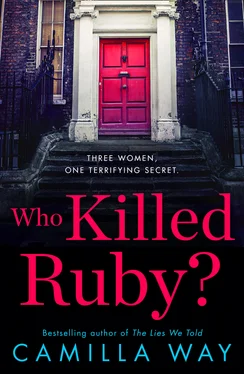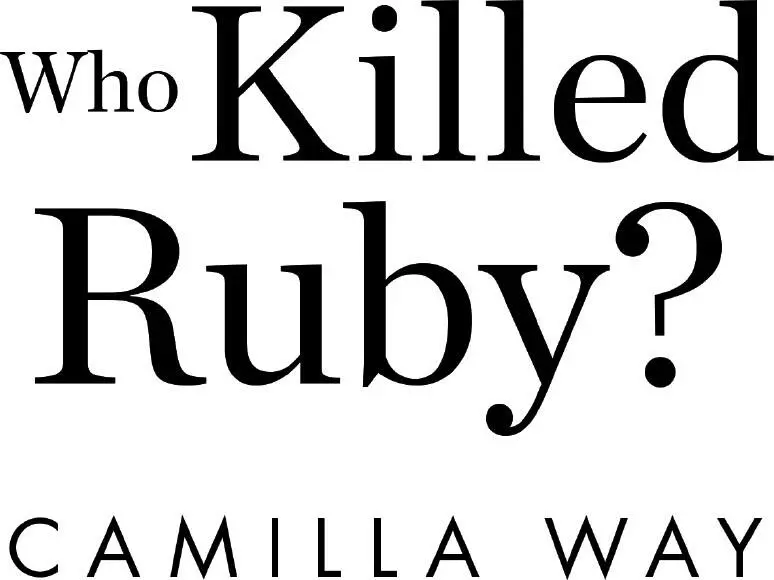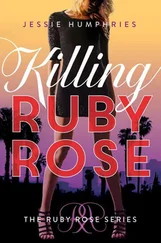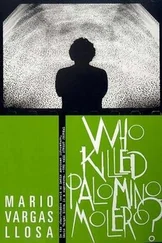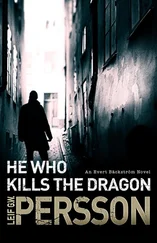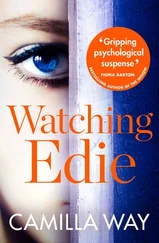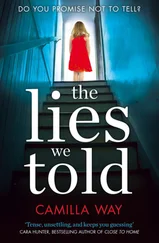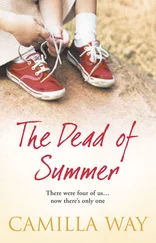
Published by HarperCollins Publishers Ltd
The News Building
1 London Bridge Street
London SE1 9GF
www.harpercollins.co.uk
First published in Great Britain by HarperCollins Publishers Ltd 2019
Copyright © Camilla Way 2019
Cover design by Ellie Game © HarperCollins Publishers Ltd 2019
Cover photograph © Magdalena Russocka / Trevillion Images
Camilla Way asserts the moral right to be identified as the author of this work.
A catalogue copy of this book is available from the British Library.
This novel is entirely a work of fiction. The names, characters and incidents portrayed in it are the work of the author’s imagination. Any resemblance to actual persons, living or dead, events or localities is entirely coincidental.
All rights reserved under International and Pan-American Copyright Conventions. By payment of the required fees, you have been granted the non-exclusive, non-transferable right to access and read the text of this e-book on screen. No part of this text may be reproduced, transmitted, down-loaded, decompiled, reverse engineered, or stored in or introduced into any information storage and retrieval system, in any form or by any means, whether electronic or mechanical, now known or hereinafter invented, without the express written permission of HarperCollins.
Source ISBN: 9780008280994
Ebook Edition © May 2019 ISBN: 9780008281014
Version: 2019-05-20
For my mum, Anna Way, with love
Contents
Cover
Title page
Copyright
Dedication
Chapter 1
Two Months Earlier
Chapter 2
Chapter 3
Chapter 4
Chapter 5
Chapter 6
Chapter 7
Chapter 8
Chapter 9
Chapter 10
Chapter 11
Chapter 12
Chapter 13
Chapter 14
Chapter 15
Chapter 16
Chapter 17
Chapter 18
Chapter 19
Eight Months Later
Chapter 20
Keep Reading …
Acknowledgements
About the Author
Also by Camilla Way
About the Publisher
They stand there, the three of them, looking at the dead man, his blood creeping slowly across the floor. Despite the savagery of his death the room is very still, almost peaceful after the violence that has led to this.
Soon the police will come. They will charge into this nice expensive kitchen in this rather lovely London townhouse with their boots, their batons, their loud authority, and will want to know what happened, whom to hold responsible.
It’s Vivienne who speaks first. ‘What will we do?’ she asks, her teeth chattering with shock. ‘What will we tell them?’
The seconds drip by slowly until her mother at last replies. ‘We will tell them that this is the man who murdered Ruby,’ she says.
TWO MONTHS EARLIER
It’s almost closing time. Outside on the dark Peckham street rain falls on flickering puddles. A man, weaving in and out of traffic and clutching a can of cider, thumps his fist on idling cars. Beyond him the Rye lies abandoned, its rain-soaked lawns and gardens, ponds and playgrounds cloaked in darkness now.
Vivienne checks her watch: ten to six, only three tables occupied still. Walton, the elderly Trinidadian who calls in most days, finishing his slice of vanilla sponge; a teenage couple on table number four, eyes locked, hands clasped over tea long gone cold. And the doctor. Her gaze flickers over him then away again as it has for the past hour, as it does every time he arrives and takes the same corner table, asking for strong black coffee, pulling a notepad from his jacket pocket and beginning to write. His fingers barely pause as the words flow in a language she doesn’t recognize. She has noticed herself waiting for him each day.
Soon Vivienne begins to shut up shop, pulling the blinds down, collecting menus and sugar bowls. ‘Closing now,’ she calls.
The teenagers leave first, with Walton close behind. ‘Goodbye, Elizabeth Taylor. Goodbye!’ he says. ‘See you tomorrow!’
She smiles and waves him off, turning back to find the doctor standing only a few feet away and she jumps to find him suddenly so close. ‘Sorry,’ she says. ‘Two coffees, was it? Three eighty, please.’
‘Elizabeth Taylor?’ he asks as he hands her the money.
It’s the first non-coffee-related thing he’s said to her. ‘Reckons I look like her, daft sod.’ She laughs to show the absurdity of it, and he smiles politely.
‘This is a nice place.’ He nods towards the pink neon sign in the window that says Ruby’s. ‘And this is your name? Ruby?’ His accent curls around the words. Is he Russian, she wonders. Polish?
‘Oh, no, I’m Viv. Ruby was my sister but she died when we were young.’
He glances at her. ‘I see. I’m sorry for your loss.’
She waves her hand breezily to show how over it she is, though in truth the very thought of Ruby makes her throat thicken, even now. ‘You live near here?’ she asks, to change the subject.
‘I work at the hospital.’ He nods in the direction of King’s College and she affects a look of surprise, as if she hadn’t already clocked weeks ago the NHS tag hanging around his neck, the name Dr Aleksander Petri in black type.
‘Well,’ he pats his pockets as if looking for something and she lets her gaze flicker over him again. He has a kind face, she thinks; his almond-shaped eyes thick-lashed and so dark as to be almost black, his mouth— ‘I must go,’ he says, jolting her from her reverie. ‘Thank you for the coffee,’ and then he is gone, the door thudding gently closed behind him.
Her friend Samar arrives moments later, his hair wet with rain. ‘Was that him?’ he asks, clapping his hands together for warmth. ‘Dr Feelgood?’
‘Yep.’ She fetches the broom to sweep the floor.
‘And?’ He looks at her expectantly. ‘Any progress?’
‘Nope.’ She pronounces the word so that it ends with a satisfying ‘puh’ and Samar rolls his eyes.
‘Ask him out, for God’s sake.’ He follows after her, helping her lift chairs onto tables. ‘Did I tell you Ted’s taking me to Paris?’ he says after a while, with unconvincing nonchalance.
She stares at him. ‘You’ve only just got back from Amsterdam! Jesus, how many romantic mini-breaks does one couple need?’ But she sees the glow in his eyes, sees how the person he was has been transformed by love, and sighs. ‘Ask if he’s got any single straight friends, will you?’
Half an hour later Viv turns the corner into Chiltern Avenue. It’s a wide, tree-lined street, the Victorian semis large and impressive, set amongst spacious, well-kept gardens. She sees her mother’s house ahead and quickens her pace as the rain picks up. Her mum’s corner of Peckham has changed almost beyond recognition in the quarter of a century that she’s lived here, the slow and steady creep of gentrification transforming what was once a shabby, unfashionably edgy part of south-east London into something shiny and desirable, the original demographic squeezed out family by family as loft and kitchen extensions, four-by-fours and a general sheen of exclusivity and wealth has taken its place.
Читать дальше
